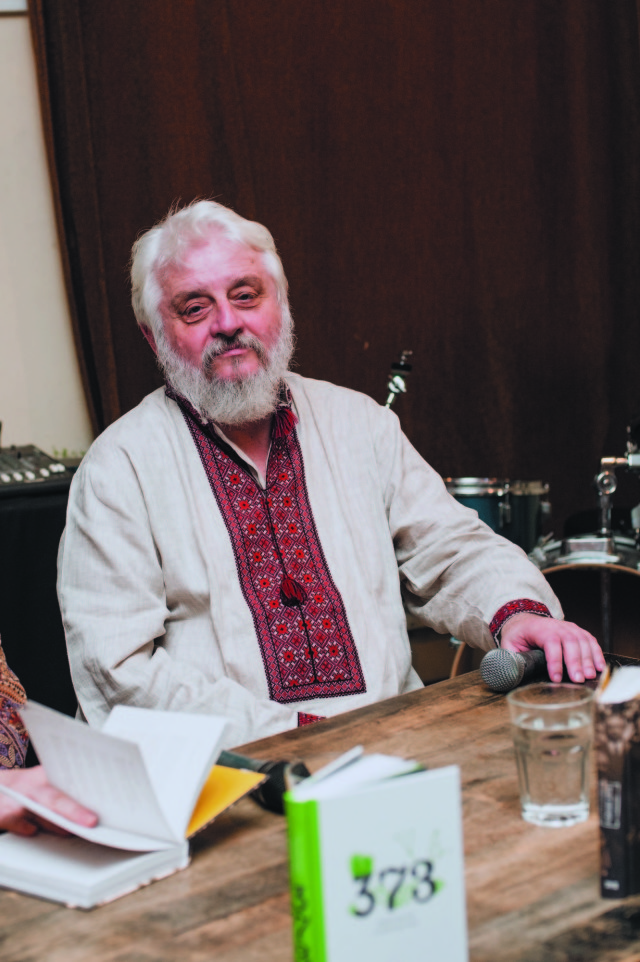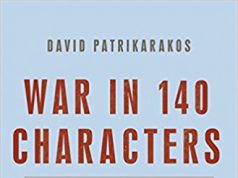The events of the past two years have divided Ukrainian poets no less than they have divided other sectors of society. The Russian-language publishing scene has changed radically. Ukraine’s best-known Russian language poet explains the literary situation.
A wonderful poet from Odessa (who now resides in Sydney), Yuriy Mikhaylik, told me this story. During the first year of Ukrainian independence, when government grants for writers had not yet been exhausted, a river trip was organized for a group of writers. They were going to be traveling down the Dnipro river on a boat. The festivities included a banquet, drinks, and of course – poetry recitals.
Mikhaylik was introduced by the poet Ivan Drach. “Mikhaylik” – he said – “is a great Russian poet who lives in Odessa”. After a pause, he added: “Well, what can we do? We have good Russian poets living in Ukraine…”
* * *
At the advent of national independence, two Soviet literatures coexisted peacefully in Ukraine – that which was written in Ukrainian and that which was written in Russian. This was in total accordance with comrade Stalin’s thesis – which stated that art must be national in form and socialist in content. Both types of literature coexisted without incident in the bleak Writers’ Union. Of course, not only “verse mongers” with party memberships belonged to this organization, some people were normal poets. Especially in Odessa, the situation stood in perfect equilibrium. The wonderful Ukrainian poet Boris Necherda and the equally great Russian poet Yuriy Mikhaylik both lived and worked in Odessa.
The term “Russian-speaking” already existed at that time, but it was not considered to be “politically correct”. The term “Russian-speaking” was used mostly by nationally conscious Russians, the kind who sneered at using the term “Russian” to refer to those who dared to write in the Russian language without also having Russian blood flowing through their veins.
There were many who thought that way.
The main divide in those days was not between literature written in Russian and Ukrainian, but between pretense and authenticity. It must be noted that authenticity does not necessarily guarantee quality (neither in literature nor other spheres of life), but nevertheless, any authenticity that managed to make its way through the moldy wall of the perestroika “pretense” years could not fail to impress.
It was an opportunity. An opportunity that was sadly missed, like many other opportunities before and after.
* * *
I always believed that any formal association of writers was a true enemy of real creativity. There are several reasons for this, chief among them being the fact that any organization necessarily strives towards limitless growth, expansion and mass appeal. Real art on the other hand, by definition, cannot have mass appeal.
Greyness and conformity will always make up the bulk of any official organization, and as the majority, it will inevitably impose its own rules. It will self-generate a ruthless and vindictive bureaucracy and devour any creativity and non-conformism from the inside.
The exclusion and blacklisting of truly great writers such as Pasternak, Solzhenitsyn and others was not a by-product, but rather the primary intended function of the Soviet state-sanctioned literary process. And as much as I disagree with the political views of Minakov, it is clear to see that his exclusion from literature is a result of the same exact processes.
The temporary gatherings and associations which are borne of literary festivals are, to me, a valid alternative to the Soviet-style organizations.
The writers’ unions of Soviet times were all in one way or another fixated on grants and the distribution of those grants was the foremost area of conflict – anonymous denunciations were not unheard of in those days. The creative process itself, for its own sake, was the aim of only a few of those who took part in the organization.
After the fall of the USSR, the grants disappeared. Not everyone understood that right away. Just to be safe, the most loyal servants of the fallen regime began serving the new one with redoubled ardor. However, it turned out that the new regime had little need for professional writers (professional journalists were another story). They did not need poems glorifying Ukraine, and they did not need historical epics. It turned out that the rapidly vanishing reader base did not need them either. Some of them did not even have that readership base to begin with. Those that did – they quickly lost it. The wild 90’s were advancing in full force.
The grants were soon gone.
But there was a twist to the story. It turned out that the literary unions owned property. Real estate. After privatization, this property could be managed to someone’s profit. And it could be warred over with great enthusiasm.
* * *
The 10th anniversary of Ukraine’s independence was marked by a great upsurge of “literary activity”. All the material that had spent years collecting dust inside the desk drawers of Soviet writers could now finally be released.
Unpublished works often exert pressure on the writer from within. The writer simply needs to make her texts “the subject of social dialogue” – as my “culturologist” friend used to say.
In Soviet times, there were many borders between the author and getting published – censorship, editors, the personal sympathies and agendas of people who served as gatekeepers to publication. Not to speak of the time necessary to thoroughly prepare materials.
All of this vanished. Publication became an assembly line. The sole issue now was paying for the typography, purchasing wine for the presentation, and to have some money set aside for the critics – who were ready to write the most positive review for the most mediocre book for a very modest sum of money.
The old writer hierarchy was dismantled. The authority of formerly leading poets was reduced to zero. Money, the obtaining of money, and money again – this is what came to the forefront.
A fourteen year old boy reads children’s’ poetry, accompanied by the city’s leading musicians and documented by all the local TV stations. His father – a businessman – decided to give his child 15 minutes of fame. Against the background of famine (sometimes quite literal), the figure of the wealthy patron gained special appeal. And if such a person were to become an “author”… what could be better?
I was observing this in Odessa and in Ukraine – but it was like this everywhere across the former Soviet Republics.
* * *
The twin phenomenon of the downfall of the authorial hierarchy together with the economic crisis brought about what I call the “feudal splintering” of literature. Books that were published in a given city (with the exception of crime and romance novels) were doomed to stay within the limits of that city. This was accurate even for publishing houses in Kyiv and Moscow. In order for a book to get to another city, someone had to bring it there physically – usually, a friend of the author. For many years, my own books published in Moscow did not make it to Odessa. And this is not to mention the poets in Lviv, Kharkiv, Donetsk…
During that time, I was in communication with writers from all over the other Ukrainian cities. In this way I met the beautiful and now, sadly, deceased Nataliya Khatkina from Donetsk. I met many Kharkiv poets, namely Anastasia Afanasyeva and Sergei Zhadan, Irina Yevsa and Stanislav Minakov – a wonderfully morbid and very Eastern Orthodox poet, whose talent has been in recent days been sadly obscured by his rabid pro-Russian rhetoric.
This comparison may be crude, but the literary exchange of those days bore many resemblances to the shadow market in smuggled trade in goods that was at that time simultaneously taking place on the post-Soviet market.
* * *
The splintering happened not only across territorial lines, but across linguistic ones as well. The Russian and Ukrainian literatures were now completely separate and totally parallel. Later, we would discover that we lived in a non-Euclidian plane and the parallels could intersect. That would take 20 years to happen. And, just like the territorial divide, this one was only overcome through personal relations, friendship, even love – if you will. Mutual translations by the Russian and Ukrainian poets living in Ukraine, invitations to Ukrainian literature festivals extended to the Russian writers living here, these were the acts of community that bridged the lines between the two communities.
You might ask – why were they not invited before? Well, an ideology existed which encouraged this – now, thankfully that sort of thinking is deceased. Russian authors from Russia were welcome guests. Russian authors from Ukraine, on the other hand, were much less welcome.
It must be said here that a certain feeling of humiliation and anger existed on both sides. To some Ukrainian poets, the very existence of Russian poets in the same country meant an infringement on their space. Some believed that Russian literature was taking away valuable resources from Ukrainian literature, stifling its potential for growth.
Identical sentiments in reverse were often expressed by Russian authors.
Eventually, we all understood that no one was taking away anyone’s resources – the resources weren’t there in the first place. Once it became obvious there was nothing to divide, the tensions began to ease.
To this day, the language divide has not been completely resolved – and I sometimes fear it might not ever be fully resolved. Some will always be of the opinion that the ethnic background of a writer is the inextricable basis of his self-identification, and that such descriptors are necessarily embedded in his creativity. Some will continue to insist on the “citizenship” of art – anything created by any citizen of Ukraine, in any language, belongs to Ukraine.
I am a firm believer that a writer’s work belongs to the language in which he writes. However, language itself does not belong to any government or state structure. The Ukrainian writer Vasyl Makhno can live and work in New York City. The writing of Aleksey Tsvetkov belongs to the Russian language – but in no way to the Russian Federation.
Earlier in this essay, I mentioned that temporary associations such as literary festivals can serve as a valid alternatives to official rigidly structured “writers’ unions”. Today, literary festivals have become something similar to scientific conferences – for several days, authors listen (or pretend to listen) to each other, communicate and network. Paradoxically, experts gain most of their information on the literary society from performances at festivals rather than directly from books themselves. An interesting example: in the span of two years, Marina Kiyanovskaya saw a sharp climb in her popularity ratings and entered the Top 10 of Ukrainian writers. This happened even though Marina had not published a single book in six years (though as of writing this essay, a large collection of her poems is set to be published after a lengthy break). It was festival presence and networking which allowed the public to appreciate her immense talents.
And now, to speak about the festivals. I’ll name three here: Kyiv Laurels organized by Aleksandr Kabanov, the Voloshinsky Festival organized by Andrey Korovin and the Lviv Literary Forum Festival directed by Aleksandra Koval.
Out of these three festivals, only Kyiv Laurels was initially intended to be a bilingual festival. There were two nominations, the categories being Russian-language and Ukrainian-language. The nominees were diverse: a Georgian and a Polish poet were among the laureates. That being said, for the first few years of the festival, the programs ran separately. At first, I attended the Ukrainian-language events – but I soon noticed there was no reciprocity from the Ukrainian side. Unfortunately, this caused me to swear off the program for two years. Then, things began to change – Ukrainian, Russian, and Belarussian poets were included in the same program. At my last Kyiv Laurels, I was paired with Marina Kiyanovskaya (I sincerely hope not for the last time!)
The Lviv festival, for a long time, was exclusively Ukrainian – but it also featured Russian poets from Russia. Later (with the help of SHO magazine editor Sasha Kabanov), some of the programs began to feature Russian-speaking authors from Ukraine and the USA. It would be difficult to imagine the forum today without the involvement of Russian-language literature in Ukraine.
On the reverse side, the Voloshinsky Festival was exclusively Russian-language. Today, especially following the illegal annexation of Crimea, the festival is something I boycott on principle – although I have no qualms with Andrey Korovin personally.
There is a fourth festival that takes place in Chernivtsi – the Meridian. It is wonderfully organized, but has a strict quota of 1-2 Russian-language authors per year. I believe that any criteria or quota other than the quality of the writing itself has no place in literature and especially poetry.
* * *
There is one more important thing to know: until recent times, for the Russian-language writers in Ukraine (including yours truly) the main axis of activity was Moscow rather than Kyiv. It was in Moscow that all the “heavyweight” anthologies and magazines of Russian-language literature were published. Moscow had publishing houses which not only did not demand payment from authors, but even paid them a modest amount – even if that payment sometimes translated only to “author’s copies”. It was home to some of the most prestigious awards, as well as festivals that encompassed an enormous territory – from Moscow to the far reaches of the Russian Federation.
Kyiv lacks a lot of these resources. There are virtually only two notable literary magazines that will publish Russian-language work – the aforementioned SHO which has only a small section dedicated to literature, and Raduga – a very conservative, traditional publication which has changed very little since its Soviet incarnation. New, promising magazines will sometimes crop up – but sponsors usually stick around for only a few issues. Kharkiv has always led a somewhat separate literary life and, even in the past, orientated itself towards St. Petersburg rather than Moscow. The excellent and notable Lviv publishing house Stary Lev published its first Russian-language book only this year.
The fate of many Kyiv publishing houses was catastrophic – Fakt ended its existence due to bankruptcy, Spadschina- Integral, which published many of my own books, has virtually ceased to exist as well.
Two years ago, the events of the Maidan drew a definitive line between those of us who value Ukraine over publication, and those of us for whom the language and the country are one and the same.
Russian-language poets, even the very good ones and even the great ones, still live and work in Ukraine, and their art and their opinions may well be polarizing.
In the immortal words of Ivan Drach – “well, what can we do about it?”
Boris Khersonsky is a physician and poet. One of the most prolific Ukrainian poets in the Russian language, he is the author of more than a dozen volumes of poetry.




































